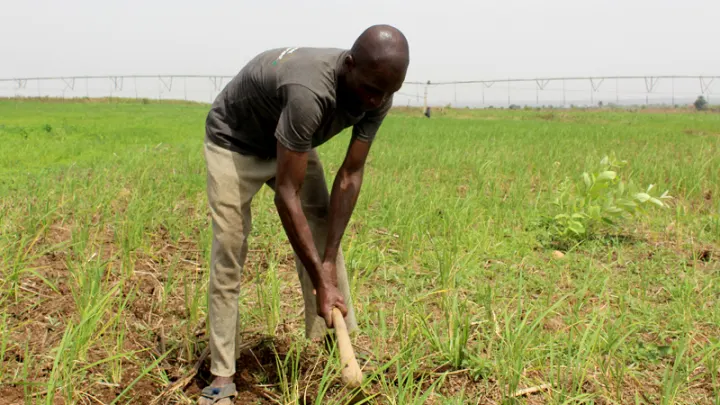By Atoyebi Nike
The Minister of State for Agriculture and Food Security, Senator Aliyu Abdullahi Sabi, says security conditions in parts of northern Nigeria have improved, allowing farmers to return to lands they had long abandoned due to insurgency and communal violence.
Speaking during a recent briefing, Sabi highlighted progress in previously volatile regions, including Birnin Gwari in Kaduna State, where local markets have reopened after more than a decade of closure. He said dry season farming has resumed in many areas, thanks to renewed security tactics directed by President Bola Ahmed Tinubu.
“This is a testament to the resilience of Nigerians,” Sabi said, commending the response to what he called a situation that could have led to national collapse in other countries.
However, the minister acknowledged that insecurity still severely affects farming communities in Benue, Plateau, and Nasarawa states. Frequent herder-farmer clashes and continued displacement mean many residents in these areas cannot access their farmland, with ripple effects on local food production.
On food prices, which remain high since the 2023 inflation spike, Sabi insisted that boosting domestic production was the best response, rather than resorting to food imports. He said wheat production, for example, had expanded from 20 hectares across 16 states in 2023 to 220 hectares this year. The ministry is also focusing on maximizing output during both rainy and dry seasons.
“When farming becomes profitable, farmers will naturally return,” he said.
Sabi also addressed rising logistics and storage costs, which the government has identified as a major driver of food price hikes. A Federal Executive Council committee is currently reviewing measures to bring these costs down.
The minister said mechanization is another critical pillar of the administration’s food security strategy. New farming equipment is arriving in the country and will be distributed through zonal service centers where farmers can rent at subsidized rates, using digital platforms to ensure transparency and track maintenance.
“Not every farmer must own a tractor, but every farmer should be able to access one when needed,” he explained, noting that the machines will be fitted with digital servicing alerts to extend their lifespan.
To prevent rural exclusion, Sabi said cooperative leaders from across Nigeria are receiving training to ensure mechanization benefits reach farmers in remote communities.
On the ongoing challenge of expensive fertilizers, Sabi said the government is focusing on smarter application techniques. A national soil training program has been launched to help farmers use fertilizer efficiently, based on soil composition and crop requirements.
“We’re moving away from blanket subsidies. The goal is to ensure maximum value from every kilogram of fertilizer applied,” he said.
Sabi maintained that agricultural transformation is essential for long-term food sufficiency and economic stability. He emphasized that cooperatives will remain the government’s main channel for delivering farm support at the grassroots.
Responding to criticism of economic hardship following the fuel subsidy removal, the minister defended the policy, saying it was necessary and backed by all major political candidates during the 2023 elections.
“President Tinubu was courageous enough to implement it, and the savings are being reinvested in infrastructure,” he said.
Still, for many rural Nigerians, especially in conflict-prone regions, the benefits of these reforms remain out of reach. In communities across Benue, Plateau, and Nasarawa, fears of attack and hunger continue to outweigh the promise of equipment, road upgrades, or strategic planning.
